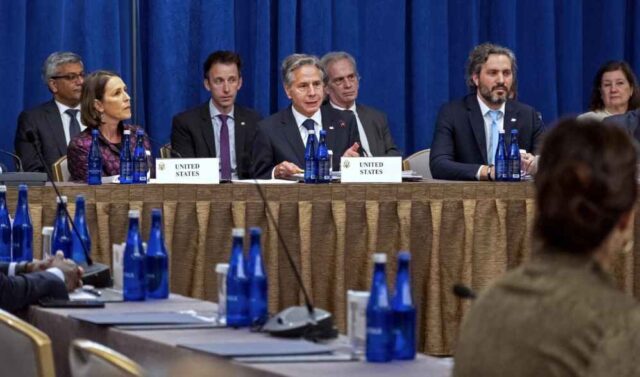In a landmark move, more than 30 Atlantic nations spanning four continents have pledged to enhance cooperation in areas such as economic development, environmental conservation, maritime security, and more. The commitment came with the adoption of the “Declaration on Atlantic Cooperation” during a meeting hosted by U.S. Secretary of State Antony Blinken on the eve of the annual United Nations General Assembly gathering. Secretary Blinken, addressing the assembly, emphasized the critical role of the Atlantic in connecting nations and sustaining global trade and communication. He noted that the Atlantic Ocean hosts the largest volume of international shipping and serves as a vital conduit for data traffic through undersea cables. However, he also underscored the perilous challenges faced by the Atlantic, including the impacts of climate change such as more frequent and severe storms and illegal fishing. “The heating and cooling of the Atlantic are influencing global climate and weather patterns,” Blinken remarked. The Declaration on Atlantic Cooperation not only underscores the need for an open Atlantic region free from interference but also commits signatory nations to uphold principles of sovereign equality, territorial integrity, and political independence. It acknowledges the unique contributions and responsibilities of each participating nation in the Atlantic region.
This concerted effort to strengthen cooperation among Atlantic coastal nations across Africa, Europe, North America, and South America was initiated last year with the creation of the “Partnership for Atlantic Cooperation,” a forum initiated by the Biden administration. Among the countries endorsing the declaration are Angola, Argentina, Brazil, Cabo Verde, Canada, Costa Rica, Cote d’Ivoire, Dominica, the Dominican Republic, Equatorial Guinea, Gabon, The Gambia, Ghana, Guatemala, Guinea, Guyana, Iceland, Ireland, Liberia, Mauritania, Morocco, the Netherlands, Nigeria, Norway, Portugal, the Republic of the Congo, Senegal, Spain, Togo, the United Kingdom, the United States, and Uruguay.
According to the World Bank, Atlantic Ocean commerce contributes a staggering $1.5 trillion to the global economy annually, with projections suggesting this figure could double by 2030. Sustainable ocean economy sectors are expected to generate nearly 50 million jobs in Africa and contribute $21 billion to the Latin American economy. However, persistent challenges include issues like illegal, unregulated, and unreported fishing, natural disasters, and illicit trafficking. The declaration comes at a time when thousands of protesters have taken to the streets of New York to urge world leaders to take more decisive action to combat climate change. Many leaders of nations responsible for significant carbon emissions will not be present at this year’s General Assembly, and some attendees, including President Joe Biden, are not scheduled to attend a climate-focused summit organized by U.N. Secretary-General Antonio Guterres. The Declaration on Atlantic Cooperation represents a significant step forward in addressing the complex environmental and economic challenges facing the Atlantic nations and underscores the importance of international collaboration in safeguarding this vital region for future generations.









